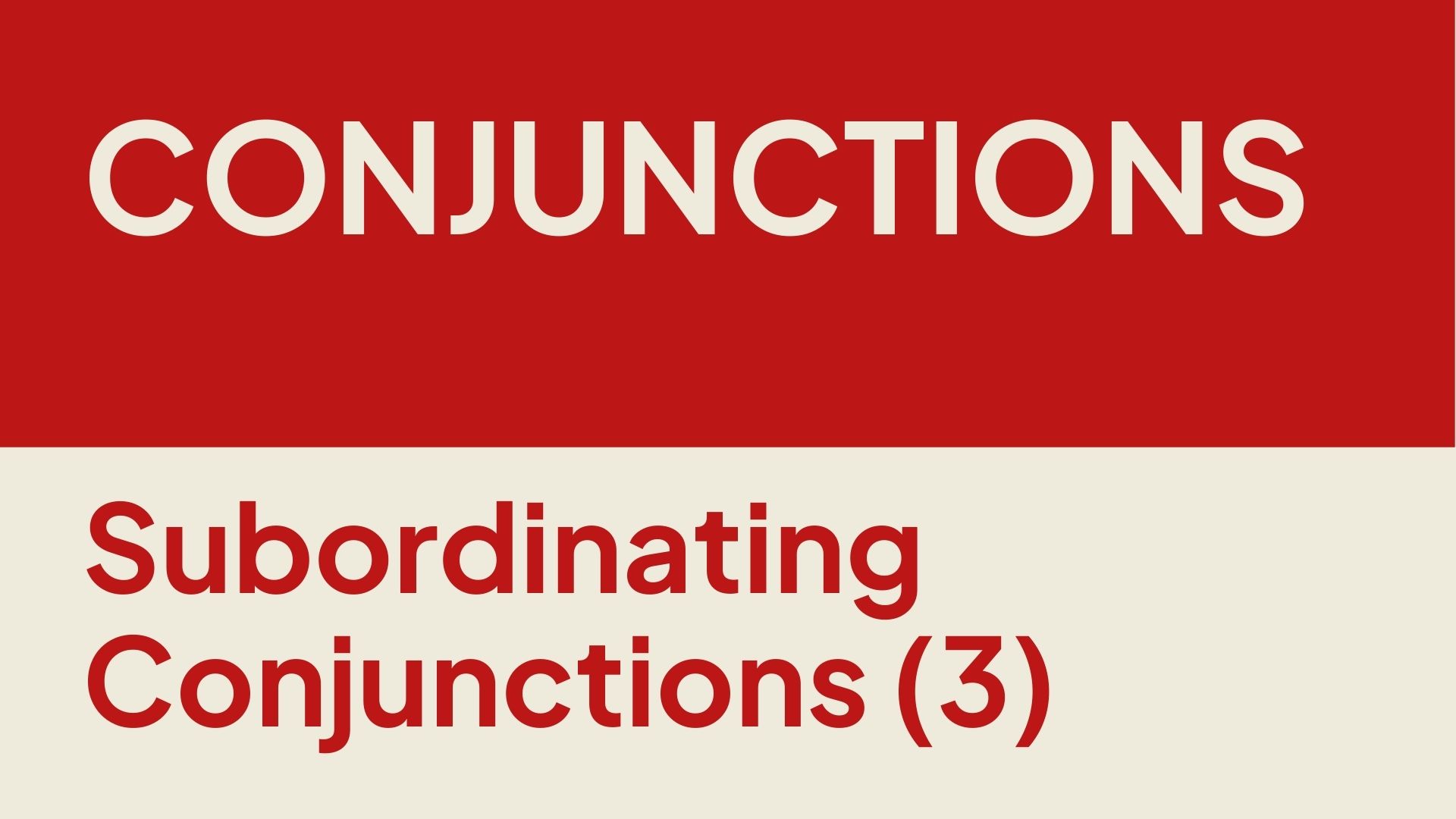
Learning Material |
|---|
There are 9 parts of speech or word classes in English language:
– nouns
– pronouns
– determiners
– verbs
– prepositions
– adjectives
– adverbs
– conjunctions
– interjections
We use conjunctions to connect words, phrases or clauses.
Jack and Jill went to the cinema last night.
– and = conjunction
– The conjunction ‘and’ connects 2 words (Jack and Jill)
I met my teacher and her husband yesterday.
– and = conjunction
– phrase = a combination of 2 words or more
– The conjunction ‘and’ connects 2 phrases (my teacher and her husband)
He knocked on the door and we went in.
– and = conjunction
– clause = a group of words that consists of at least 1 subject and 1 verb
– The conjunction ‘and’ connects 2 clauses
– 1st clause: He knocked on the door (subject= he, verb = knocked)
– 2nd clause: We went in (subject= we, verb = went in)
Independent Clauses
There are 2 types of clauses:
– Independent clauses
– Dependent clauses
Independent clause is a clause that can stand on its on (can be understood on its own).
He knocked on the door and we went in.
– ‘He knocked on the door’ = independent clause
If it is not combined with ‘we went in’, we can still understand the clause.
– ‘We went in’ = independent clause
If it is not combined with ‘he knocked on the door’, we can still understand the clause.
It’s an old car, but it’s very reliable.
– ‘It’s an old car’ = independent clause
If it is not combined with ‘it’s very reliable’, we can still understand the clause.
– ‘It’s very reliable’ = independent clause
If it is not combined with ‘it’s an old car’, we can still understand the clause.
We use subordinating conjunctions to connect a dependent clause and an independent clause.
He was angry because he missed the bus.
– ‘He was angry’ = independent clause
– ‘he missed the bus’ = dependent clause
– because = subordinate conjunction
Dependent clauses usually give additional information to independent clauses.
He was angry because he missed the bus.
– Dependent clause ‘he missed the bus’ explains the reason for the independent clause ‘he was angry.’
There are several types of subordinating conjunctions:
– Conjunctions of Cause and Effect
– Conjunctions of Purpose
– Conjunctions of Time
– Conjunctions of Place
– Conjunctions of Condition
– Conjunctions of Contrast
We use conjunctions of time to:
– explain the condition for something to happen.
Conjunctions of condition:
– if
– unless
– as long as
– provided
We’ll stay at home if it rains.
– ‘We’ll stay at home’ = an action
– ‘if it rains’ = a condition
– if = conjunction of condition
– if = in the event that; on the condition that
He won’t go to sleep unless you tell him a story.
= He won’t go to sleep if you do not tell him a story.
– ‘He won’t go to sleep’ = an action
– ‘unless you tell him a story’ = a condition
– unless = conjunction of condition
– unless = except if
We will go as long as the weather is good.
– ‘We will go’ = an action
– ‘as long as the weather is good’ = a condition
– as long as = conjunction of condition
– as long as = only if
You can go out to play provided you finish your homework first.
– ‘You can go out to play’ = an action
– ‘provided you finish your homework first’ = a condition
– provided = conjunction of condition
– provided = only if
When the independent clause comes first, we do not need a comma after the independent clause.
We’ll stay at home if it rains.
We’ll stay at home, if it rains. (wrong)
He won’t go to sleep unless you tell him a story.
He won’t go to sleep, unless you tell him a story. (wrong)
We can reverse the order of the clause.
When the dependent clause comes first, we put a comma after the dependent clause.
If it rains, we’ll stay at home.
If it rains we’ll stay at home. (wrong)
Unless you tell him a story, he won’t go to sleep.
Unless you tell him a story he won’t go to sleep. (wrong)
We use conjunctions of contrast to:
– contrast or compare two things/present differences between two things.
Conjunctions of contrast:
– tough/although/even though
– whereas
– while
– even if
Anne likes Tim though he often annoys her.
– ‘Anne likes Tim’ = a fact
– ‘though he often annoys her’ = a contrasting fact
– though = conjunction of contrast
– though = despite the fact that
We thought he was arrogant whereas he was just very shy.
– ‘We thought he was arrogant’ = a fact
– ‘whereas he was just very shy’ = a contrasting fact
– whereas = conjunction of contrast
– whereas = compared with the fact that
While Tom’s good at science, his brother is hopeless.
– ‘his brother is hopeless’ = a fact
– ‘While Tom’s good at science’ = a contrasting fact
– while = conjunction of contrast
– while = despite the fact that
I feel tired even if I go to bed early.
= Whether I go to bed early or not, I feel tired.
– ‘I feel tired’ = a fact
– ‘even if I go to bed early’ = a contrasting fact
– even if = conjunction of contrast
– even if = whether or not
‘Though’ and ‘although’ are similar in meaning.
‘Even though’ is similar to ‘though/although’ but it makes a stronger contrast:
Anne likes Tim though he often annoys her.
= Anne likes Tim although he often annoys her.
= Anne likes Tim even though he often annoys her. (stronger contrast)
Multiple-Choice Quiz |
|---|

Time's up